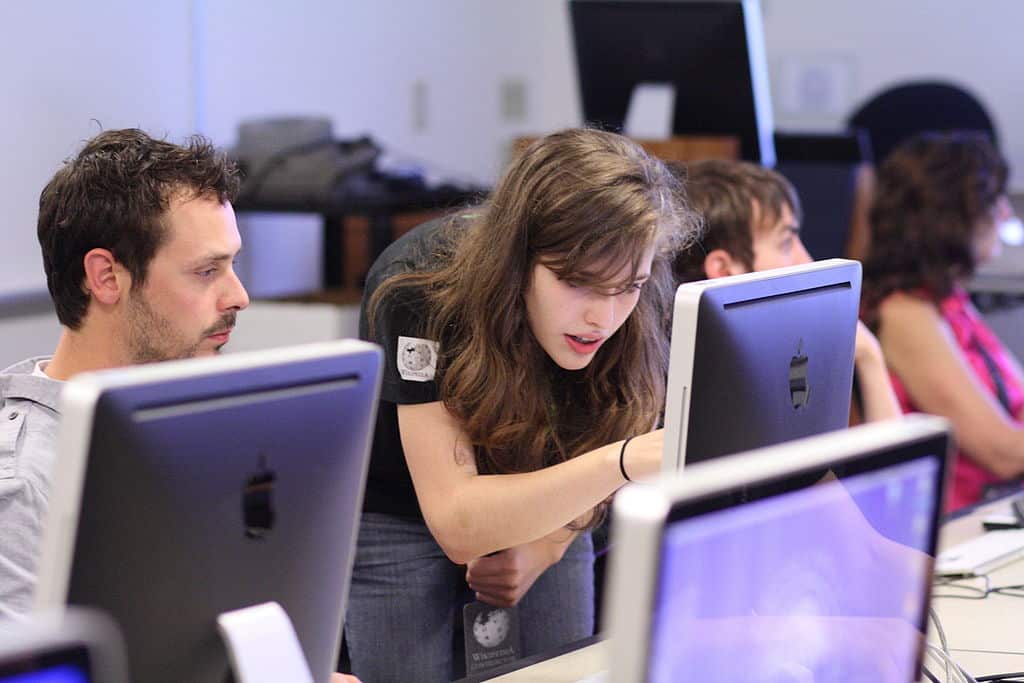The Present Future Potential of Online Education
Wide-ranging reflections on the future of digital education based on current innovations, by Lura Sanborn
Below is a three-part series on Flourishing with Online Education by Lura Sanborn. Lura is a research librarian for a prep school in central NH, where she teaches research skills & sources, selects the library’s digital content and creates research guides. In her free time she advocates for coconut-based ice-cream flavors at her husband’s sweet shop and dreams of a future filled with robots. See Part 1 of this series, Addressing Three MOOC Misgivings and Part 2 – Dear MOOCs: “I do”.
Bowed by the weight of centuries he leans
Upon his hoe and gazes on the ground,
The emptiness of ages in his face,
And on his back the burden of the world.
Who made him dead to rapture and despair,
A thing that grieves not and that never hopes,
Stolid and stunned, a brother to the ox?
Who loosened and let down this brutal jaw?
Whose was the hand that slanted back this brow?
Whose breath blew out the light within this brain?
– Edwin Markham, “The Man With a Hoe”
When asked to think about what the web will look like in 25 years for a 2014 Pew study, Google’s chief economist, Hal Varian had this to say, “The biggest impact on the world will be universal access to all human knowledge. The smartest person in the world currently could well be stuck behind a plow in India or China. Enabling that person — and the millions like him or her—will have a profound impact on the development of the human race.” That same power-of-equalization sentiment was expressed almost 100 years earlier by Lady Astor, England’s first female member of Parliament, saying at a 1922 conference, “I’m here because the women have the vote. Think what a disaster for the world if I had been hidden in a two-room cottage instead of the House of Commons.” Just as the right to vote was an equalizer of content creation and contribution, and with it bringing great advancement, digital education has the potential to act as another powerful catalyst for equality of content and contribution and to get us all out from behind plows, fields, and two-room cottages, as in the Edwin Markham poem above.
A Breakthrough in Access

By Sage Ross (Own work) [CC BY-SA 3.0], via Wikimedia Commons
Digital education brings education, and all its associated ideas, theories and knowledge to potentially billions of humans, who, just a few years ago, didn’t have any educational opportunity at all. Many of you may be aware of and have likely participated in some form of online education. Courses offered by prestigious ivory towers (such as edX offerings from Harvard, MIT, Berkeley), intro to advanced college courses (Coursera) job skills (Udacity) are available to all with internet access. An elementary school student can pursue astrophysics, an armchair psychologist can enjoy lectures on Jungian psychology, we all can broaden our minds with TED talks (hat tip, Beyoncé!), and grandparents can sharpen math skills in preparation for homework helping via Khan Academy.
From a practical lens, the convenience factor in and of itself is huge. A Slate article from early 2014 pointed out that fully 80% of those currently engaged in obtaining an undergraduate degree are not the residing-on-campus, aged 18-22 crowd. This 80% represents folks returning to or starting school outside of that 18-22 age range often simultaneously while balancing work and family life. Digital education removes the geographical limiter, blessedly so, and education, for many in that 80% consumer pool, becomes an option where previously it was not. At Georgia Tech’s computer science master’s program, for example, “The average student in the online program is 34 years old; the average residential student, 23.” Digital education more broadly, has a measured universal appeal, and unlike the on-campus experience, is not limited to a specific age range.
Digital education…is not limited to a specific age range
In a quickly forthcoming environment of drones, robotics and androids, humans delve deeper into an ability-based, idea and knowledge economy, a new environment in which Arianna Huffington believes, “Creativity matters above all else.” Mobile learning coupled with digital libraries will be needed for cultivating the behaviors, thought, ability and creativity necessary for human participation in this type of economy and culture. And at last, with a technological backbone, we can all participate. As beloved Dumbledore said, “It matters not what someone is born, but what they grow to be.” With the grace of digital education we can now add that it matters neither where someone is born. Plows, fields, and two-room cottages suddenly become less of an influence.
Perhaps the edX folks are taking another giant-step-for-mankind in that direction. EdX is working with Saudi Arabia’s Ministry of Labor to provide edX course “aimed at rural communities, women, youth and persons with disabilities.” Admittedly, open access to education in an environment that has a reported 58% internet access rate, combined with tightly prescribed gender expectations, may not be a magic pill, but it would seem an important step. Further, in a partnership with the Rwandan government and Facebook, edX is bringing accessible digital education to that country’s population via mobile devices, via SocialEDU.
High Quality, Personalized Learning Experiences
Excitingly, one of these partners, Facebook, has purchased virtual reality technology, Oculus. Could that be our classroom of the future: piano lessons with Bach, physics by Leo Szilard, and ballet taught by Baryshnikov, alongside a menu of courses by today’s great minds, all from inside one’s personalized virtual-reality. If we have Bach and Itzhak Perlman on hand, teaching us Baroque counterpoint and how to play the violin, how many additional counterpoint and violin teachers will we need? How many introductions to Biology, English 101, and Physics for Poets professors are required in a digital education economy? Will there be a selected stable of a handful of thought-leaders that are also rock-star teachers? Maybe a master box containing these great lectures, available for institutional subscription? Will students be able to hop from MOOC to MOOC with background software accurately assessing mastery and when mastery of a specific set of courses is achieved, be awarded a (nameless? de-institutionalized?) degree? This all sounds like a wonder of unlimited, high-quality education, delivered when needed/wanted and brought to us via screens, games, videos, and virtual reality exercises.
Could that be our classroom of the future: piano lessons with Bach, physics by Leo Szilard, and ballet taught by Baryshnikiv
The data analysis possible as a result of this new, student-centered digital model has rather electrifying potential. If Jane McGonigal is right, and we can game our way into becoming better beings, from sticking to health goals, mastering personal finances, and lifting our sense of well-being, how about linking this high-quality educational gaming with algorithmic predictors tailored to the individual’s educational performance? The GRE’s algorithms selects questions based on the respondents prior answers, SNHU’s course management software uses an algorithm to predict when a student would benefit from additional professor contact and when a student is likely to fail. David Evans, a University of Virginia computer science professor and early Udacity instructor, suggests data-analysis is inherently valuable to potential employers. Clearly. What tech firm wouldn’t want to talk to the top 5 performers from a computer science class of 200,000?
From a microscopic lens, what could this data mean to the individual? Perhaps a more accurate career match, based on displayed ability combined with self-selected courses of interest? If Amazon’s algorithm can cleverly predict I will enjoy The Duchess of Duke Street and 6-week 6-Pack, and I Heart Radio knows I will enjoy Pavarotti’s belting of Ava Maria and later, a little Aguilera, what would a career-path algorithm predict based on my academic performance and course selection? Along the way would it have suggested appropriate courses and training models (at what point would it have told me to ditch the violin)? I have a feeling the predictor algorithm would do a better job than I would, and likely saved years of sweaty anxiety (I have to pick a major?!?), inappropriate classes (geology?), and time/effort spent with little discernible yield (rhythmic dictation).
Would this result in greater success and happiness during the educational process and in the workforce? According to recent Gallup research (2013) only 13% of workers are engaged while at work, worldwide–‘engaged’ being defined as “psychologically committed to their jobs and likely to be making positive contributions to their organizations.” Could right-sized to the individual, machine-learning based algorithmic coursework suggestions increase engagement, leading to a happier, more productive workforce and more meaningful experience for working humans?
Could…algorithmic coursework suggestions increase engagement?
Delightfully, research on neuroplasticity suggests humans can be taught to build their brains. As we are learning personalized AP calculus, could the digital educational environment be built to include educational activities that will strengthen our well-being, our pro-social behavior all while scaling-up our grey matter? If it is true (as apparently it is) that “we can fundamentally improve our cognitive and emotional capacities” can we then teach our way not only into understanding subjects but into becoming better beings? Courses such as Harvard’s edX course GSE1.1x Unlocking the Immunity to Change: A New Approach to Personal Improvement come to mind, for which a student commented in a review:
“Awesome approach to behavioral change, and doing the real work it takes to create something new and lasting. Applications everywhere from business, academic, to personal.”
But At What Cost? Well, Less…

The future of books by Johan Larsson
In terms of free, open digital education, two Wharton Business School professors write, “Based on our experience at the Wharton School, we show that it costs just pennies to register a new student in a MOOC and a few dollars for every student that actually completes the course.” In a recent email solicitation from Kahn Academy, they write, that $30 “can help us provide 720 hours of free education over the next year.” In terms of tuition, for credit, degree-awarding digital education, the Georgia Institute of Technology offers a master’s in computer science, all online, for $7,000. The cost of the on-campus experience for a master’s in CS: $40,000.
This is reminiscent of Southern New Hampshire University’s 2008 program, that allowed off-campus students to take traditional classes at off-site office buildings for a 60% reduction in tuition. If colleges can offer lower tuition rates for those physical yet off-campus students that don’t use the gym, public safety, dining halls, custodial services, what type of tuition could then be offered to digital students who produce absolutely zero wear and tear on buildings, technology, and require minimal staff? Again at SNHU, one can complete an online undergraduate degree for $10,000, a degree that has been approved by the New England Association of Schools and Colleges. That’s $2,500 a year compared to the $37,800 per year average for a private non-profit, in-person, higher ed school.
In other for-credit, massively open news, Arizona State University recently announced its Global Freshman Academy in conjunction with edX. Interested students can complete an entire freshman year of undergrad credits, online, for $200 per credit, without the hassle of the admissions process. Payment is made after successful completion of the course, and the ASU transcript does not delineate whether the course was taken online or on campus.
The University of Illinois is offering a similar model. Courses are available free to all, on the Coursera platform. At any point in the program, a student may elect to apply to the iMBA program and any of the digital coursework completed will be considered as part of the application package. From Coursera’s announcement “Performance in the Specializations will be considered for student admittance, not just test scores and past transcripts…” Cost? The whole degree is estimated to be $20,000 in tuition compared to $50,000 to take the degree in-person at this and similar MBA-granting institutions. Granted, $20,000 isn’t free, but all the content is, and the online MBA degree is 60% off from the on-campus version.
A Future Within Our Grasp
Education often brings with it greater opportunity for employment. Thinking about the bottom line as combined with the greater good, the 2015 Gates letter states that if women in India and Africa were employed at the same rate as men, these countries “gross domestic product (GDP) would go up 12 percent.” Digital education brings good for the individual as well as good for the collective.
Digital education brings good for the individual as well as good for the collective
Perhaps the time has come to re-think the higher education model that encourages deep contribution and creation only when one (usually) reaches the graduate school level. If young students can develop popular, money-making apps, if they can 3-D print prosthetics for a friend, if they can develop a virtual reality system, build a Braille printer out of Legos, if they can survive Shark Tank, all without their formal education model supporting these endeavors, imagine what could be created and what advancements made if the educational system was tailored to support and encourage these types of achievements. What flourishing would we see if the system was designed to support innovation, problem-solving and content/item creation, integrated into a personalized, responsive, educational system?
Before closing, I think it is important to remember that digital education is just beginning. At the moment, digital education has modeled itself on the classroom of the past. Lectures, quizzes, assessments, often some sort of discussion space all parsed out over a course term. Perhaps this isn’t the ideal model of learning and training. Early cell phones, with their bread loaf-sized heft, were focused on meeting the mission of the land-line: making a phone call. Thirty years later, the phone has evolved into a mobile device surpassing early home computers. While I use my phone consistently (too much!) throughout every day, the feature I use the least? The making-a-phone-call feature. What could digital education look like in 25 years? A 2014 OCLC white paper believes that “We are tipping toward an educational era of choice over tradition, convenience over perfection, self-service over predefined options.” The foundation blocks for new approaches are only now being set into place, and the innovation just begun.
It is important to remember that digital education is just beginning
While digital education looks and feels a bit different than chalk and slate, unchanged is the mission of education; knowledge, skill sets, preparation for employment and the world, and perhaps most importantly, the ability to flourish. As part of the educational process, one will likely gain utility skills: grammar, welding, an understanding of Socratic philosophy, depending upon the individual, their chosen program and institution. Simultaneously woven throughout the educational environment is the nurturing of the ability to achieve, to have potential, to flourish, which is indeed the more important higher-order aim of education. Technology can partner with great teachers to support, suggest, craft and escort the individual throughout a lifetime of education, indefatigably and incandescently upping our potential to flourish.
References
Alden, Doug. “SNHU Offers 4-year Degree for $10,000.” Union Leader, May 6, 2014, 1. http://infoweb.newsbank.com/.
Crabtree, Steve. “Worldwide, 13% of Employees Are Engaged at Work.” Gallup Poll. Accessed January 23, 2015. http://www.gallup.com/poll/165269/worldwide-employees-engaged-work.aspx.
Gais, Hannah. “Saudi Arabia Gets MOOC’d up.” Al Jazeera America, September 2, 2014, Opinion. http://america.aljazeera.com/opinions/2014/9/saudi-arabia-massiveopenonlinecoursesgendersegregation.html.
Gates, Bill, and Melinda Gates. “2015 Gates Annual Letter: Our Big Bet for the Future.” Gates Notes: The Blog of Bill Gates. Last modified 2015. Accessed May 17, 2015. http://www.gatesnotes.com/2015-annual-letter?page=4&lang=en.
“Hangouts with Entrepreneurs: Joy in the Workplace in 10 Minutes.” Video file, 10:04. YouTube. Posted by Google for Entrepreneurs, June 2, 2014. Accessed July 13, 2014. https://www.youtube.com/watch?v=BVPeswBbTgM.
High, Peter. “MIT Team Turns 6.9 Million Clicks into Insights to Improve Online Education.” Forbes, August 11, 2014. http://www.forbes.com/sites/peterhigh/2014
/08/11/mit-team-turns-6-9-million-clicks-
into-insights-to-improve-online-education/.
Kahn, Gabriel. “The Amazon of Higher Education: How Tiny, Struggling Southern New Hampshire University Has Become a Behemoth.” Slate, January 2, 2014. Accessed July 13, 2014. http://www.slate.com/articles/life/education
/2014/01/southern_new_hampshire_
university_how_paul_leblanc_s_tiny_
Kahn, Sal. “Give just $1/day and provide 720 hours of free education.” E-mail message to author. May 22, 2015.
Koller, Daphne. “Daphne Koller: Announcing the first MBA on Coursera from the University of Illinois.” Coursera Blog. Last modified May 4, 2015. Accessed May 24, 2015. http://blog.coursera.org/post/118152158892
/daphne-koller-announcing-the-first-mba-on.
Kornhaber, Spencer. “Beyoncé’s ‘Flawless’: The Full Story.” The Atlantic, June 26, 2014. Accessed July 13, 2014. http://www.theatlantic.com/entertainment/archive
/2014/06/the-full-story-of-beyonces-flawless/373480/.
Lewin, Tamar. “Instruction for Masses Knocks down Campus Walls.” The New York Times, March 4, 2012. Accessed July 13, 2014. http://www.nytimes.com/2012/03/05/education
/moocs-large-courses-open-to-all-topple-campus-walls.html?pagewanted=all&_r=0.
Markham, Edwin. “The Man with the Hoe.” Address. In Oregon: Her History, Her Great Men, Her Literature, by John B. Horner. 363. 1919. http://books.google.com/books?id=IG8UAAAAYAAJ.
Marsh, Jason. “A Little Meditation Goes a Long Way.” Editorial. Greater Good Science Center. Last modified February 9, 2011. Accessed October 21, 2014. http://greatergood.berkeley.edu/article/
item/a_little_meditation_goes_a_long_way.
McGonigal, Jane. Reality Is Broken: Why Games Make Us Better and How They Can Change the World. NY, NY: Penguin, 2011.
OCLC. At a Tipping Point: Education, Learning and Libraries. 2014. PDF.
Pew Research Center. “Digital Life in 2025.” Pew Research Internet Project. Last modified March 11, 2014. Accessed July 13, 2014. http://www.pewinternet.org/2014/03/11/predicting-the-future-on-the-webs-25th-anniversary/.
Rivard, Ry. “Massive (But Not Open).” Inside Higher Ed, May 14, 2013. https://www.insidehighered.com/news/2013
/05/14/georgia-tech-and-udacity-
roll-out-massive-new-low-cost-degree-program.
Rothberg, Michael V. “EdX Partners with Facebook to Provide Open Online Education to Rwanda.” The Harvard Crimson, February 26, 2014. Accessed July 13, 2014. http://www.thecrimson.com/article/
2014/2/26/edx-partners-with-facebook/.
Rowling, J.K. Harry Potter and the Goblet of Fire. NY, NY: Scholastic, 2000.
Sherman, John Dickenson. “The Astonishing Lady Astor.” The Jasper News (Jasper, MO), July 6, 1922, 3. Accessed July 13, 2014. http://chroniclingamerica.loc.gov/lccn/sn90061052/
1922-07-06/ed-1/seq-3/#date1=1913&index=11
&rows=20&words=Astor+Lady&searchType=
basic&sequence=0&state=&date2=1922&proxtext=%22lady+astor%22
&y=0&x=0&dateFilterType=yearRange&page=1.
Straumsheim, Carl. “MOOCs for (a Year’s) Credit.” Inside Higher Ed (Washington, D.C.), April 23, 2015, Technology. Accessed May 27, 2015. https://www.insidehighered.com/news/2015/04/23/arizona-state-edx-team-offer-freshman-year-online-through-moocs.
———. “One Down, Many to Go.” Inside Higher Ed, June 6, 2014. https://www.insidehighered.com/news/
2014/06/06/one-semester-students-satisfied-
unfinished-georgia-tech-online-degree-program.
Terwiesch, Christian, and Karl Ulrich. “Will Video Kill the Classroom Star?” Mack Institute News. Last modified July 16, 2014. Accessed September 5, 2014. http://mackinstitute.wharton.upenn.edu/
2014/will-video-kill-classroom-star/.
Union Leader. “SNHU Program Offers Tuition Discount.” May 6, 2008, Local, B2. http://infoweb.newsbank.com.
U.S. Department of Education; National Center for Education Statistics. “Average Total Tuition, Fees, Room and Board Rates Charged for Full-time Undergraduate Students in Degree-granting Institutions, by Type and Control of Institution: Selected Years, 1981–82 to 2011–12.” Table. 2013. http://nces.ed.gov/fastfacts/display.asp?id=76.








